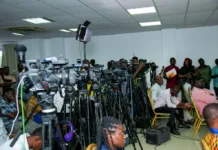
About 30 local journalists in Kumasi who have interest in science, agriculture and economic reporting have benefitted from a training programme facilitated by the US Embassy, Ghana.
The editors and journalists drawn from both the electronic and print media were taken through topics on understanding biotechnology, Ghana’s biosafety regulatory systems, its implications on food security and the economic growth by key industry players.
Speaking to the Ultimate Business at the end of the two-day event, Press Attaché at the US Embassy Ghana, Sara Stealy said the resource gathered by the journalists would go a long way to enhance their reportage on biotechnology and biosafety.
“The media play an important role in educating the public on complex issues like biotechnology and Ghana’s scientists and researchers recognize this,” she remarked.
“So we at the Embassy wanted to support them in putting out this workshop so that they could bring journalists together and give them foundational knowledge on the science behind biotechnology so that journalists can help educate the public; so that there will also be factual, informed, evidence-based discussion about biotechnology and the role it can play in food security”.
Ms Stealy also expressed hope that the journalists would “take advantage of the knowledge that they had gained”.
“Now they have contacts in the scientific community that they can reach out to. The goal is that stories about biotechnology are evidence-based, that they bring the conversation up to a level that audiences can understand and can grasp the science behind these issues and have a good discussion about what it means for Ghana”, the US Embassy Press Attaché added.
The biotechnology training workshop for journalists which started in Accra, came through the Ashanti capital, Kumasi and will end in the Northern regional capital, Tamale.
Source: Ghana/Starrfmonline.com/103.5FMPatricia Ama Bonsu



